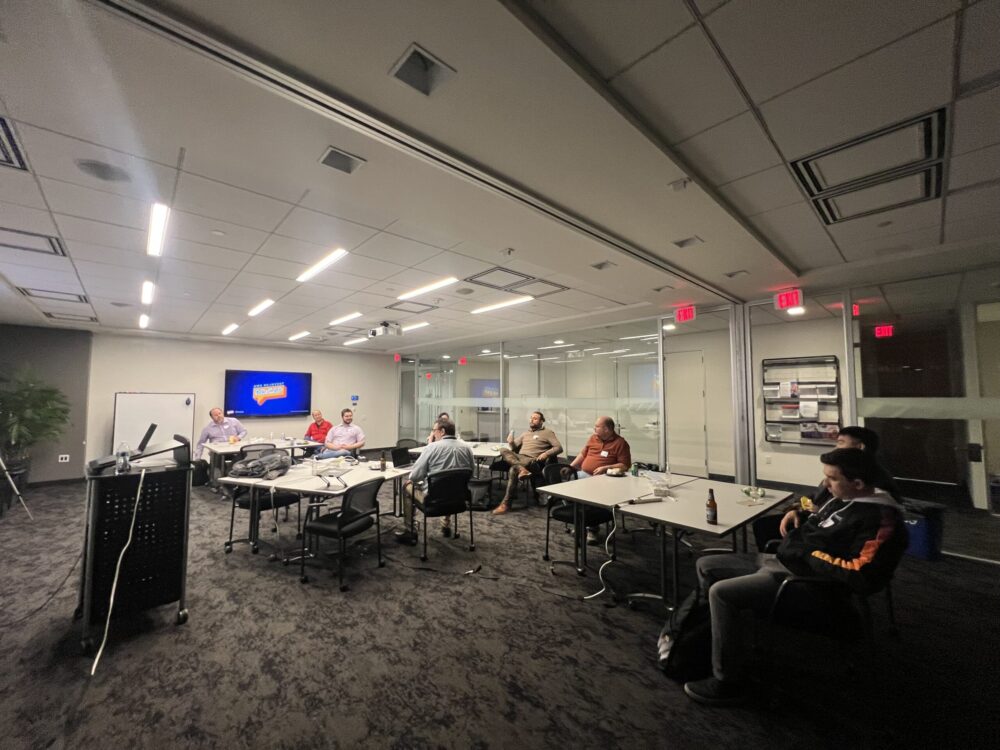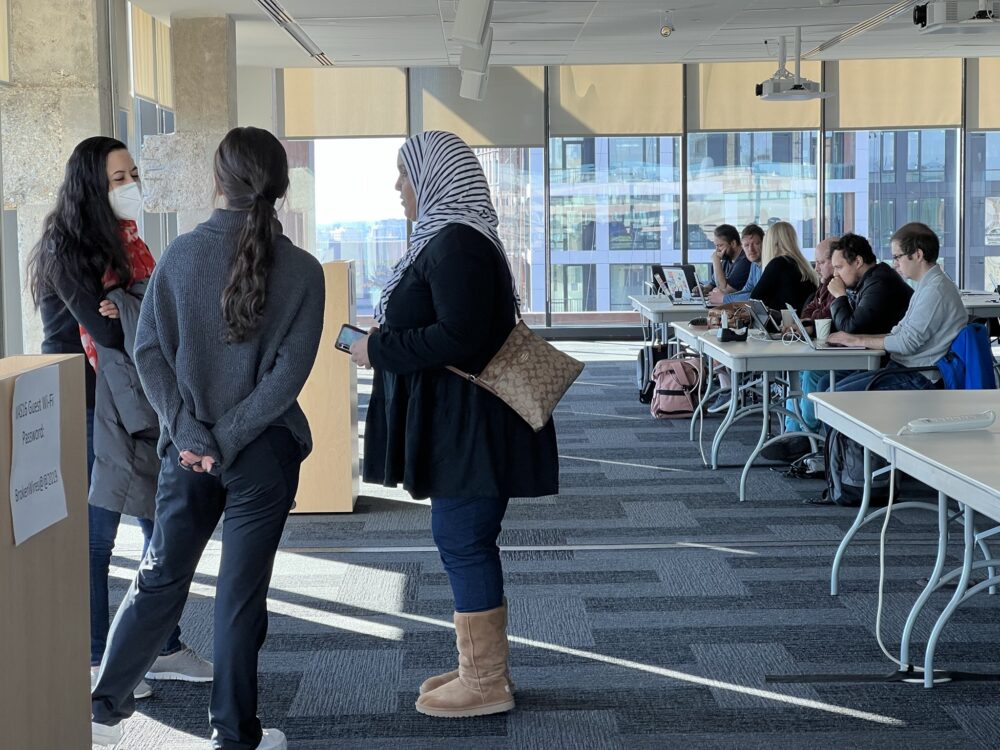Though not a technologist herself, she stumbled into this pandemic hobby of collecting meetup groups — after finding many couldn’t figure out how to keep up with the community on computer screens — with the goal of keeping them alive as meetups struggled to exist virtually. Now, she’s the force behind a number of meetup groups in the area, including DevOpsDC, AWS Community Day, AWS Cloud Security and Capital Business Development Association.
“I was just literally catching them all, I was like a Pokemon ball,” Nguyen told Technical.ly. “You have an organizer open? I’ll take it.”
We all know the story of the workplaces that switched to virtual back in March of 2020, never returning to in-person work. But the pandemic also had an impact behind the scenes in DC: the meetup groups that many local technologists attended after-hours. From making friends to landing jobs to just nerding out about tech together, these were previously spaces to build community outside of the workplace. But they suffered from a “Hunger Games” of trying to hold virtual attention, leaving groups defunct, leaderless or without anywhere to go when it was safe to meet again.
For those that did survive, 2023 is becoming the year of IRL returns, with many local groups holding non-virtual events for the first time in three years — and, hopefully, returning to the role of a third space for local technologists.
The virtual dilemma
Founder and technologist Casey Watts first joined the DC meetup scene after moving from New Haven, Connecticut, where he had also taken part in tech groups. Joining in on a DC Ruby meetup, he said, felt like coming home. In the time since, he’s organized a number of groups in the area including Empathy in Tech, Baltimore Tech Stack, DC Product and Pastries and a few Code and Coffees.
“What I really want from meetups, honestly, is connecting with peers, connecting with other people as friends or professional people to talk about these nerdy things that I can’t necessarily talk to my mom about,” said Watts.
For newbies, meetups are a chance to network for jobs and make friends. For others, they’re opportunities to level up their tech skills outside of work. And for many, like Watts, a meetup lets them deep-dive with other locals who actually understand what they’re saying.
But while virtual does have its benefits, namely accessibility and saving time, organizers said they found it difficult to keep virtual events going. Jen Pengelly, an organizer of NoVa Code and Coffee, said the meetup tried a few virtual events in April of 2020 but found them unfavorable to the types of conversations the group usually held. Moreover, it was hard for people to go off and work on a project together.
“Let’s be honest: It’s way easier to stream a meetup from your computer,” Pengelly said. “But I struggle with that format, I find it easier to be in-person, there’s less content-switching, I’m more engaged with what people have to say.”
Still, since she sees meetups as about the broader community, Pengelly thinks that hybrid events will continue and be the best way to bring the DC tech community together.
Robbie Holmes, a founder and organizer of a few different groups (including multiple Code and Coffees), said that during in-person events, he would often greet everyone at the door to level the playing field upon arrival. But he found it difficult to find a virtual substitute.
“That’s part of what in-person events catered to more. It’s harder to bring in new community members when you’re virtual,” Holmes said. “It’s hard enough to convince someone to join something they’ve never been a part of. But when it’s virtual, it feels even less welcoming.”
Where to start

A DataOpsDC meetup event in January. (Courtesy photo)
Fast-forward and meetups are looking at a resurrection in 2023. But for many groups, there are two main struggles to reconnecting in person. For one, with so many companies moving from IRL offices to remote, finding a venue is not as easy as it once was. Spaces also might need to run HVAC or have security, which can be difficult and costly to facilitate on weekends. Plus, many are dealing with leadership changes — organizers that led the group pre-pandemic may have moved away or are too burnt out to restart.
Watts said he found several meetups’ leadership struggled without clear replacements, since many groups were on hiatuses.
“A lot of the old leadership, you can call them the old guard, maybe, are tired and burnt out. They don’t want to do it anymore,” Watts said. “There’s natural turnover anyway, and now there’s also COVID turnover.”
For Nguyen, an event planner by nature, keeping these groups alive is a labor of love. Often, she said, she’s spending about three hours after 5 p.m. running these groups, finding sponsors, setting up speakers and attending other groups. But for technologists, especially those who are new to the area, she thinks participating in these groups remains crucial with the industry’s huge move to remote work.
“If you’re coming into this area, you’re not going to find people at your Wegmans or something. You have to take an effort to find groups like this to really engage with people,” Nguyen said. “Otherwise, due to the nature of the world and the technology industry, you’re pretty much holed up in your room remote-working.”
A spring refresh
As the year carries on, many think that the return of in-person meetups has strong potential. Holmes believes there’s a lot of excitement for people to come together — especially because many who opted not to attend IRL meetups pre-pandemic felt like they missed out when the chance was taken away.
“It’s coming back, the blooms are starting to happen around the garden,” Holmes said. “It feels like we’re entering a new spring and people are starting to come out of their hibernation, people are starting to find venues.”

A Code and Coffee meetup. (Courtesy photo)
The silver lining of many organizers moving away: Plenty of new people to take over. For the first-timers, Holmes suggests paying attention to where meetups need support. If you offer to help out, he said, organizers will almost definitely take you up on it, and he thinks it’s a very fulfilling way to give back.
“There are lots of ways where communities give to you, but the longer you’re around, it’s amazing how much you being a part of the community will actually benefit you and you’ll be able to give back to the next generation,” he added.
Pengelly said coming back to the first NoVa Code and Coffee felt like nothing had changed. The energy was the same, and she found some familiar faces in the crowd. But she noticed that there weren’t quite as many bootcamp grads, so she hopes to see more junior developers at future events; she found her own first job in tech thanks to a meetup. For those interested but scared to attend, she advises just going for it, though it might help to find some designated meetup friends to accompany.
“If there is something in-person and you’re comfortable with it, I say: Definitely go; the easiest way to meet people is to meet people,” Pengelly said. “It sounds ridiculous but it’s true. Just be out there, put yourself out there and try to be there.”
Banjo Obayomi, who created the DataOpsDC Meetup in 2018, said the meetup took a break after finding virtual didn’t provide the same stimulation. But the group held its first in-person gathering on Jan. 24, and approximately 15 people showed out — less than the meetups a few years ago, but still a good start, he thinks. He’s confident that things will pick up over the summer and into the rest of the year, and technologists will be reunited with these unique spaces.
“If you’re a tech person and you want to learn and connect with the community, there’s a meetup for you out there,” Obayomi said.
Before you go...
Please consider supporting Technical.ly to keep our independent journalism strong. Unlike most business-focused media outlets, we don’t have a paywall. Instead, we count on your personal and organizational support.
3 ways to support our work:- Contribute to the Journalism Fund. Charitable giving ensures our information remains free and accessible for residents to discover workforce programs and entrepreneurship pathways. This includes philanthropic grants and individual tax-deductible donations from readers like you.
- Use our Preferred Partners. Our directory of vetted providers offers high-quality recommendations for services our readers need, and each referral supports our journalism.
- Use our services. If you need entrepreneurs and tech leaders to buy your services, are seeking technologists to hire or want more professionals to know about your ecosystem, Technical.ly has the biggest and most engaged audience in the mid-Atlantic. We help companies tell their stories and answer big questions to meet and serve our community.
Join our growing Slack community
Join 5,000 tech professionals and entrepreneurs in our community Slack today!

The person charged in the UnitedHealthcare CEO shooting had a ton of tech connections

Delaware students take a field trip to China using their tablets and ChatGPT

From rejection to innovation: How I built a tool to beat AI hiring algorithms at their own game



